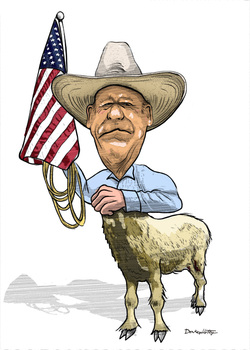
Simply put, it describes a figure of speech in which a word that becomes associated with a thing is used in place of that thing. Wikipedia uses “Hollywood” as an example. Literally speaking, it is a city in California. But when people say “Hollywood,” they often are referring to the film industry, or to decadence in general, not to the city.
Utahns, and other people in the West, had better hope “Cliven Bundy” doesn’t become a metonym for legitimate issues involving public lands.
But it may be too late.
Bundy, whose battle against the Bureau of Land Management over where his cattle may graze in southern Nevada, has been a reminder of how the free spirit of many Westerners is always just a tossed cow pie or two from open rebellion against authority.
| | And when that authority is Washington, their personal cause can become a symbol of something much larger — be it the faceless and impersonal might of a government typified by NSA spying or the craven disregard for personal property rights. It doesn’t help matters when a media-friendly standoff ensues between ordinary looking people and heavily armed BLM officers. Anything that echoes the guns of Waco or Ruby Ridge, Idaho, isn’t going to induce calm, clear thinking. A few days ago, more than 50 lawmakers from nine Western states met in Salt Lake City to discuss how to get the federal government to transfer ownership of most of the federal land within their borders to their respective states. Unlike in southern Nevada, there were no threats, no claims that the land is being held in violation of the Constitution. And yet Cliven Bundy seemed to be hanging everywhere like a backdrop. That makes it hard for a rational discussion to take place about whether Washington really ought to hold onto, and manage, vast amounts of Western land containing natural resources that might be responsibly extracted. In Utah, the feds own 66 percent of the state, and while no one is talking about getting Uncle Sam to let go of national parks, is it really unreasonable to question why Washington should hold onto so much land when it long ago relinquished control of land in older states? The answer should be no, but given what has happened in Nevada in recent days, everything seems to take on the tint of unreasonableness. A few days ago, I spoke with former Utah congressman Jim Hansen, who reminded me of a bill he sponsored that would have set a Dec. 31, 2014, deadline for the government to “convey to the state all right, title, and interest of the United States in and to the federal land.” He urges the state’s current congressional delegation to take up the failed legislation and try again, even though he knows it wouldn’t pass the Senate — at least not until after November’s election. But right now that sounds a bit too much like telling Bundy the nation will forgive his unpaid grazing fees and let him do as he pleases, which really should have nothing at all to do with the issue. That’s how metonyms can be. They get in the way of seeing things as they are. To be sure, the idea of transferring control of federal land raises tough questions, not the least of which is how the state would pay to manage the land. And those who vehemently support one side or another in this fight ought to consider that state ownership might not change things much. The state would have to balance the needs of extraction companies, environmentalists, recreationists and local residents just as the feds do now. The only thing missing would be the impersonal touch of a Washington agency that tends to lean with the party that controls the White House and that thrives in the warm mud of bureaucracy. But when Bundy began spewing racist nonsense, and when it became clear that his family probably never had rights to the BLM land on which his cattle graze (contrary to his claim, Nevada media say records show his family bought the ranch in 1948, including water rights, but bought no claim to the federal land that surrounds it), it may have associated his name with the issue in a way that keeps more reasonable minds from seeking a rational solution. |

 RSS Feed
RSS Feed

